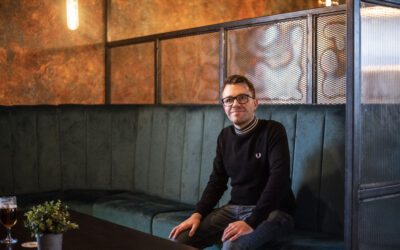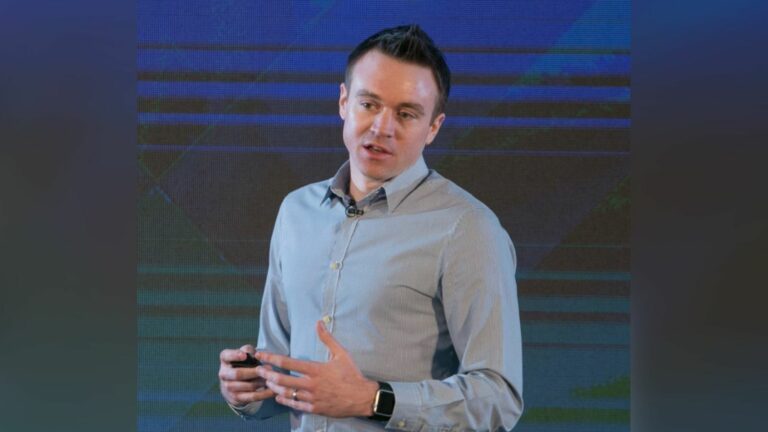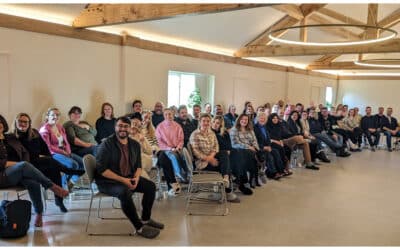Collctiv is a fintech app based in Manchester, designed to make group payments simple and seamless.
Founded in 2019, Collctiv is the brainchild of co-founders Pete Casson and Amy Whitell and has recently been selected to join Tech Nation’s latest fintech growth programme.
Pete Casson also serves as Collctiv’s Chief Technology Officer, where he oversees technical development and business growth.
He has previously held a number of senior roles across the tech industry, including as Chief Technology Officer at Sheffield-based edtech Twinkl.
Pete Casson shares his career journey and tips with us…
How did you first get into your industry?
I had my first ‘professional’ job in IT when I was 18. I took a gap year after my A-Levels and worked for an IT support company that specialises in Thin Client technology. I was a junior engineer and would travel nationwide installing infrastructure for businesses. I gained invaluable, early hands-on experience on how to build, design, and develop infrastructures and installing systems for clients such as Dunelm Mill. I had no industry qualifications and only got a ‘C’ at A-Level computing.
What do you love about your job?
The constant change and evolution of technology, it’s never stagnant. For some it can be overwhelming to keep up to date with everything, but for me I love it and it keeps me engaged and curious. I’ve always seen technology as an enabler for people and something that shouldn’t get in the way, it should be invisible and just work. I’ve taken that ideal and applied it to everything I’ve done since.
Who – or what – has inspired you in your career?
There’s not one specific person that’s inspired me. I’m constantly inspired by what other people and businesses are doing with technology. I remember a time before the internet and just seeing what was possible with the first websites, then later seeing mobile technology take off with the iPhone, and now we’re looking at AI and quantum technology, it’s incredible how it’s evolved over a very short period of time. What I really enjoy is seeing someone take a prince of technology and use it in a way that is magnificent and something that the creator never imagined it could be used for.
What are the biggest challenges about your job?
Prioritisation is always the hardest part. You are never short of things to do but understanding and enforcing a priority against them is difficult. It’s easy to fall into the trap of completing the task for the person that’s shouting the loudest or doing the task that looks the most appealing, but you have to learn to say no or de-prioritise an activity. Learning to say no has been one of the biggest lessons for me, you don’t need to do everything and saying no can be more important than saying yes.
What skills have been the most crucial to you succeeding in your career so far?
The ability to try something new, to have the bravery to go out of your comfort zone and be prepared to fail, sometimes spectacularly. Without the ability to try new things you’ll stay down a very narrow path and not allow new ideas or perspectives to enter your thought process.
Mixing this with a willingness to help people can open some amazing doors. If you help other people they will help you in return.
What was your first salary and what could someone getting into the industry expect to earn nowadays?
My first salary as a junior network engineer was minimum wage, which back then would have been around £12k. These days for the same role you’d comfortably get double that plus benefits. There is still the London bubble but salaries outside of London have increased dramatically.
Senior specialists can easily ask for six figure salaries with good benefits and potentially share options. It’s a completely different situation from 20 years ago, there have been influences from the USA and now with the ability to remote work it’s much easier to get those higher paying roles.
What education or training would be most useful for someone looking to follow your career path?
Communication and sales. Probably not the two areas you would expect for a technology role but will make you a much better candidate than other people. The ability as an engineer, developer, architect, etc to be able to communicate, not just internally but with customers, allows you to gain insight and understanding that you wouldn’t normally get.
Being able to sell really changed my perspective as an engineer. I understood what the customer was looking for and what their needs were, I could then create new services, products and solutions to fit those needs. It also gave me the ability to talk in their language. The tech industry is notorious for acronyms and complex terms, having the ability to translate those terms into real-world, accessible language that customers understand will make you infinitely more valuable within business.
What advice would you have for someone looking to follow your path?
Get stuck in with other departments in business, work with marketing, sales, finance, HR, product development, security, legal. You’ll get a complete understanding of business and what it takes to become a leader in one. Learn how to look after people and become a leader, be humble and understand that you do not have all the answers, surround yourself with people who are better than you.
Never be the smartest person in the room, get out of your depth and take on positions that you may feel you aren’t ready for. Everyone learns on the job, no one knows everything about the role they are in, that’s part of the fun, learning new skills and not knowing what the day could bring. Most of all, just get on with it, don’t wait to take the first step, it’s not as scary as you think, once you take the first one keep going and enjoy the journey.











